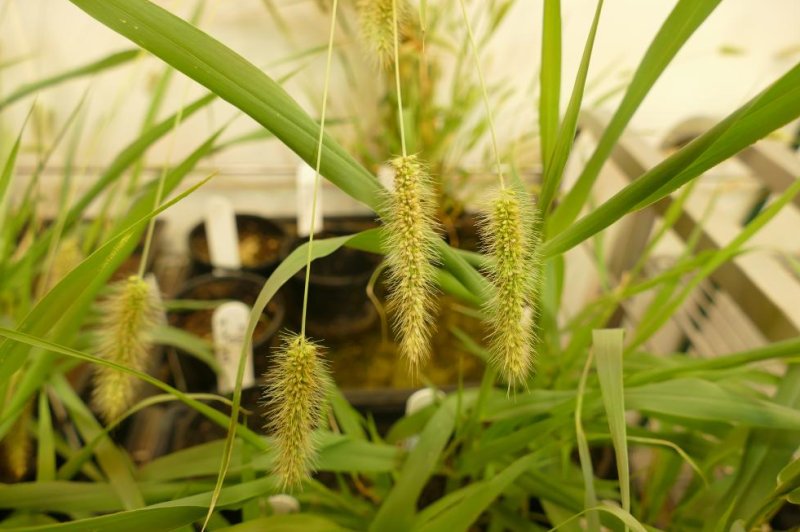Researchers conducted experiments using the plant Setaria viridis, a close relative of maize and sorghum. Photo by Natalia Bateman/CoETP
Aug. 16 (UPI) -- Scientists have discovered a way to ease a bottleneck in the photosynthesis process. The breakthrough could allow plants to turn the sun's rays into food more efficiently, boosting crop yields.
In lab tests, scientists found they could accelerate a plant's conversion of sunlight into food by encouraging the production of a protein that controls the rate in which electrons flow during photosynthesis.
"We tested the effect of increasing the production of the Rieske FeS protein, and found it increases photosynthesis by 10 percent," lead researcher Maria Ermakova, a scientist at the ARC Center of Excellence for Translational Photosynthesis in Australia, said in a news release. "The Rieske FeS protein belongs to a complex which is like a hose through which electrons flow, so the energy can be used by the carbon engine of the plant."
When scientists triggered the over-expression of Rieske FeS proteins, more electrons flowed during the photosynthesis process.
Plants use one of three metabolic pathways for carbon fixation during the photosynthesis. Most research into accelerating photosynthesis has focused on the C3 pathway, which is utilized by wheat and rice. The latest research focused on accelerating the C4 pathway, which is used by crops like maize and sorghum.
"These results demonstrate that changing the rate of electron transport enhances photosynthesis in the C4 model species, Setaria viridis, a close relative of maize and sorghum. It is an important proof of concept that helps us enormously to understand more about how C4 photosynthesis works," said study co-author Susanne von Caemmerer, deputy director of the Center of Excellence for Translational Photosynthesis.
Researchers detailed their breakthrough this week in the journal Communications Biology.
Several studies have recently highlighted the need for changes in diet and land use patterns if climate change is to be slowed and global warming limited to 2 degrees Celsius. Breakthroughs that boost photosynthesis could allow farmers to grow more food with less land, a necessity if the agricultural sector is to feed the world's growing population while aiding the fight against climate change.
"It is really exciting, as we are now ready to transform this into sorghum and test the effect it has on biomass in a food crop," von Caemmerer said.















